 |
|
Verdun to the Vosges
Impressions of the War on the
Fortress Frontier of France
by
Gerald Campbell
Special
Correspondent of The Times in the East of France
|
|
 |
|
This is
the 1916 Second Impression
A scarce contemporary account of
the French Army on the Western Front. |
 |
|
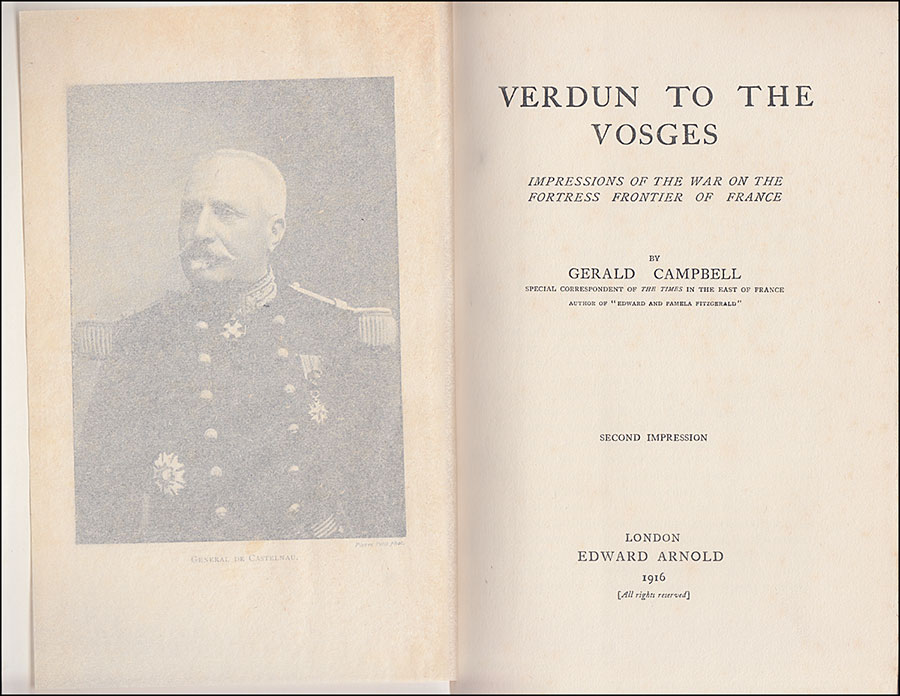
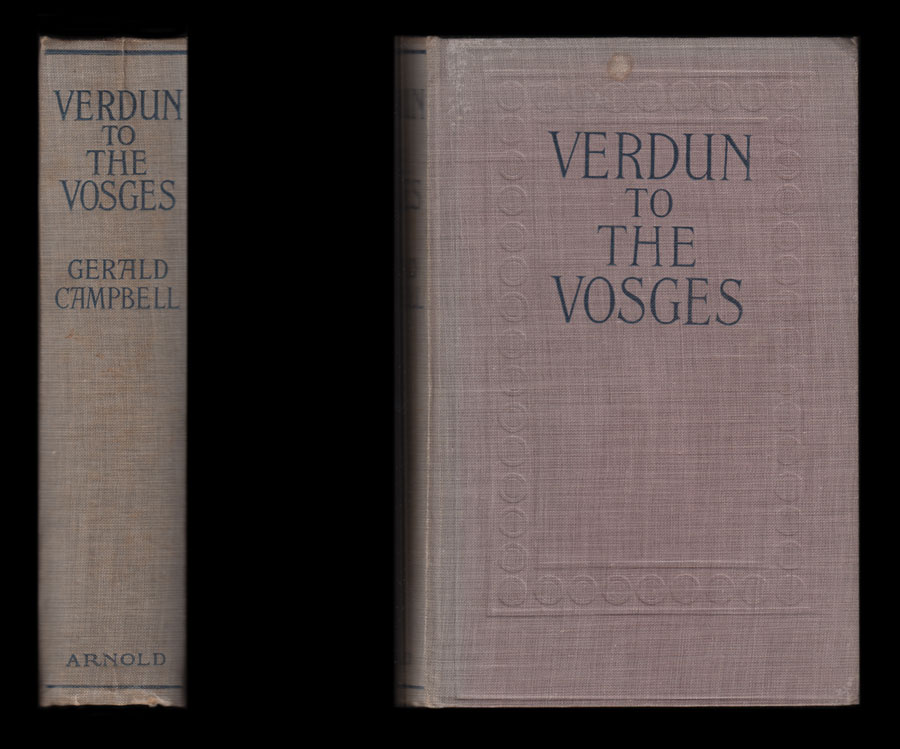
Front cover and spine
Further images of this book are
shown below
|
|
 |
|
 |
 |
|
|
|
Publisher and place of
publication |
|
Dimensions in inches (to
the nearest quarter-inch) |
|
London: Edward Arnold |
|
5¾ inches wide x 9 inches tall |
| |
|
|
|
Edition |
|
Length |
|
1916 Second Impression |
|
[xix] + 316 pages |
| |
|
|
|
Condition of covers |
|
Internal condition |
|
Original grey cloth blocked in black (or navy
blue?). The covers are
rubbed and a little dull, with one small but prominent stain on the front
cover, near the top edge. The spine has faded and is soiled and discoloured. The corners and spine-ends are bumped and frayed,
with some splits in the cloth (including some very minor loss at the tail of
the spine). There is a half-inch crease in the cloth at the head of the
spine. |
|
There is a previous owner's name and date
("Maude Wilson 1916") neatly inscribed in ink on the front free end-paper.
The inner hinges are a little tender but still holding, although there is
some play. The paper has tanned with age and there is scattered
foxing; in particular, there is toning and heavier foxing to those pages
adjacent to the photographic plates. The illustrations have acquired a
yellowish tinge, while the text is quite clean throughout. The edge of the
text block is dust-stained and foxed, and is also untrimmed, resulting in a
slightly ragged appearance. |
| |
|
|
|
Dust-jacket present? |
|
Other
comments |
|
No |
|
Showing signs of age but internally quite
clean, and, overall, still quite a good example of a 1916 Edition. |
| |
|
|
|
Illustrations,
maps, etc |
|
Contents |
|
Please see below for details |
|
Please see below for details |
| |
|
|
|
Post & shipping
information |
|
Payment options |
|
The packed weight is approximately
900 grams.
Full shipping/postage information is
provided in a panel
at the end of this listing.
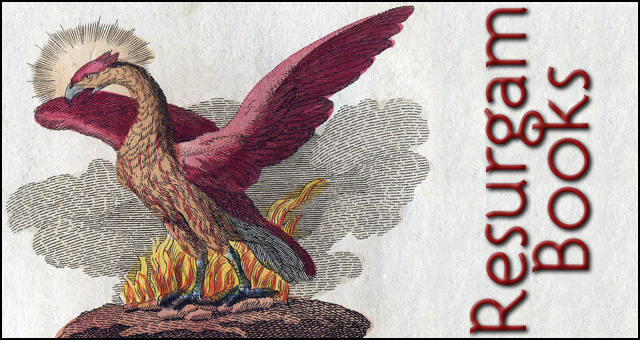 |
|
Payment options
:
-
UK buyers: cheque (in
GBP), debit card, credit card (Visa, MasterCard but
not Amex), PayPal
-
International buyers: credit card
(Visa, MasterCard but not Amex), PayPal
Full payment information is provided in a
panel at the end of this listing. |
|
|
 |
|
  |
|
 |
 |
|
Verdun to the Vosges
Contents
Chapter I
LONDON TO DIJON
Departure from London, September 8th, 1914 — A German officer's analysis of
the invaders' plan of campaign — Paris — General condition of doubt and
uncertainty — Travelling during the Battle of the Marne — Effect in France
of the news of the victory
Chapter II
DIJON TO BELFORT
Arrival in Dijon — The laisser-passer difficulty — Besancon — An anxious
moment — Arrival at Belfort — Doubtful reception — A Socialist private —
Manifesto "Aux Camerades Socialistes" — National Service — A
Capitalists' War — The Strike of Strikes — The struggle for freedom —
Etat de siege — A city of darkness-Welcome by the Governor
Chapter III
IN ALSACE
On German soil — Montreux Vieux — The first ruined village — Towards
the Rhine — A night reconnaissance in Alsace — Ferette — Covert drawn
blank — Cheerfulness of the French soldier — His longing for home — His home
at the front — Taube " over " — A Colonel's hobby — An army in earnest .
Chapter IV
ROBBERY UNDER ARMS
Eve of the War —
French neutral zone along the frontier — German raids in time of peace —
Sunday, August 2nd — The affair at Joncherey — First blood — A German epic —
The Suarce raidr — Bobbery under arms — Political importance of the
incident —
Prisoners of war where no war was
Chapter V
BELFORT TO NANCY
News of Nancy —
German lies — Security of Belfort — After twelve months — Breakdown of
German plans — Visit to the Prefet of Belfort — A Prefect's duties and
position — Check on militarism — Special duties during the war — The
Prefets and Sous-Prefets of the frontier Departments — Posts of danger —
Example and precept — Return to Dijon — Chalindrey — British Tommies —
Wounded French officers — Toul — Arrival in Nancy
Chapter VI
ETAT-DE-SEIGE IN NANCY
Discouraging start in
Nancy — General de la Masselliere — Visits to the Prefect and Mayor — Their
appointment — Madame Mirman — Their example — The Lorraine stock —
Nancy by night — The sound of the guns — A united people — The French
renaissance-Nancy newspapers — Nancy hospitals — Nursing sisters
Chapter VII
THE FRENCH OFFENSIVE
The German
territorial gains — Bearing on peace proposals — The French offensive —
General moral effect — Uncertainty as to direction of German attack —
Sources from which eastern armies were drawn — Their offensive — General
account — In the Woevre — Verdun and Longwy — From the Moselle to Mul-house
— The frontier force — Justification of the offensive — Description of
frontier — Of Alsace — Importance of the Vosges — The Sundgau — First
French advance on August 7th — Altkirch retaken
Chapter VIII
OCCUPATIONS OF MULHOUSE
Advance on Mulhouse —
Unopposed entry — Popular rejoicings — German counter-attack —
Smallness of French force — Their repulse — Terrorism —
Harsh treatment of foreigners — Be-organization of French under
General Pau — Second advance on Mulhouse — Battle round the town — Victory
of the French — Second occupation began
Chapter IX
MORHANGE
Description of the
Vosges — French advance — Triumphs in Lorraine — The check at Morhange
— Why the French fell into the trap — The disaster — New birth of the
army — Bad news — The offensive abandoned
Chapter X
GENERAL DUBAIL'S STAND
Combination of
reverses for France — Soldiers' ignorance of contemporary events — Reliance
on barrier of fortresses — Determination to fight in the open — Different
conditions — Position after Morhange — German advance — Troupe de Charmes —
Epinal — Vesouze, Mortagne, and Meurthe — Brave resistance of Dubail's army
— The reverse of the picture — The terrorists' Credo — Condemnation of
frightfulness — An example — The German excuse
Chapter XI
THE MARTYRED TOWN
Gerbeviller — Visit
with M. Mirman — The ruins — Murder of old men — How the town was taken —
Incendiarism — Soeur Julie — An act of " sacrilege " — Other martyred
towns — Badonviller — The first occupation — The second — Fight in the
streets — St. Benoit — Col de la Chipotte
Chapter XII
BATTLE OF THE GRAND COURONNE. I
The battle of the
Grand Couronne — Two parts — The position south of the Meurthe — Transport
of Dragoon regiment from Alsace — Arrival at Charmes —
Towards Luneville — Procession of fugitives — Description of field of
battle — South and north of Meurthe up to Nancy-Luneville road — General
Bigot's divisions — Retreat of the XVth and XVIth Army Corps — General
retreat — Luneville abandoned — Position of XXth Army Corps — The
troops from the south reformed — A miracle — The battle begins — Germans
cross Mortagne and Meurthe — A battle symphony — Across the field of battle
— Scenes of desolation — The battle continued — German attack checked
— Retreat turned into advance — The XVth Army Corps leaves for the Argonne —
Their-regeneration
Chapter XIII
BATTLE OF THE GRAND COURONNE. II
Nancy, the woman-town
— Absence of fortifications — Attitude of her defenders — The pivot of the
line — Kaiser's dreams of conquest — Description of four German lines of
attack — Of the country — General de Castlenau's line — Champenoux villages
— Remerville — Farms and cottages — Loopholed blockhouses — The
wounded — The refugees — Account of Nomeny — German brutality — Rottenness
of German civilization — Germany's future — Inspiration of
soldiers of Lorraine — The part of the women — A woman's letter
Chapter XIV
BATTLE OF THE GRAND COURONNE. III
The attack on. Nancy
from the north — St. Genevieve — The assault — How it was repulsed —
The attack from the east — Dombasle — Gourbesseau — Remereville —
Soldiers' disregard of fire — In Champagne — French
disadvantages in Lorraine — Their gallantry — Individualism —
Main attack from north-east — Attack on plateau of Amance — -September
8th — Importance of the date — What it meant to the Kaiser — Final assault
on Amance — Relations between Battle of the Marne and Battle of the Grand
Couronne' — Bombardment of Nancy — The German retreat — Last struggle in
Champenoux — Losses of the victors — Their graves — The horror of the
horizon — The reassurance of the front
Chapter XV
LUNEVILLE
Effect of Battle of
the Grand Couronne on Luneville — Extent of damage in the town — Entry of
Germans — Familiar faces — M. Minier, M. Mequillet, M. Keller — Faubourg
d'Einville burnt — German Governor's proclamation — Hostages — Plight
of inhabitants — Outside the town — The turn of the tide — France and
Germany — A duel to the death — Last fights before the town — German
bestiality — General Joffre's message — The last advance —
French enter the town — Restored to France
Chapter XVI
NEWSPAPER CORRESPONDENTS
After the storm — A
Prefect's duties — Newspaper correspondents — War a serious matter —
Enemy's means of information — On the battlefield — " Behind the front" —
German dread of newspapers — Their own — French and British — The
truth concealed — In Belgium — Effect in neutral Switzerland — Change of
opinion due to knowledge of state of internes — Confidence of M. Mirman
— The Times an agent for good — Expulsion from Nancy-Hopes of return
Chapter XVII
A DAY WITH A PREFECT
A Conseil de Revision
— Comparison with English recruiting — French boys' enthusiasm — Their
experience of terrorism — A greybeard — The Mayors of Lorraine — A war to
kill war — Lunch at the Prefecture — Through the French army — At the
front — A deserted village — Towards Nomeny — A check — Retreat — M.
Puech — A souvenir — French sang-froid
Chapter XVII
THE ATTACK ON THE RIVER FORTS
Position after Battle
of the Grand Couronne' — German failures reviewed — Mystery of Manonviller —
Position of Toul — Of the barrier of fortresses — Description of the Woevre
— Troyon — The first bombardment — German demand for surrender — The
attacking force — Relief from Toul — The attack abandoned — Renewed
bombardment of the river forts — Formation of the St. Mihiel triangle
Chapter XIX
THE "SOIXANTE-QUINZE"
The Emperor William —
His advisers — The modem Huns — The barrier of the trenches — The
Soixante-Quinze — Its superiority to its German rival — The French gunner —
Pride of the nation in its artillery — Determination in the workshops — The
struggle of the trenches — A German description
Chapter XX
SIEGE WARFARE
Second period of the
war — Germany besieged — The pressure on the west — Partial offensives — The
lack of shells^-Its effect on the war — "Craters of Death" — Monotony of the
trenches — A National Army — Soldier-priests — Their contempt of death —
Their self-sacrifice — Their spiritual work — Influence on the troops — The
realities of life — Church and State — The example of the State — Spirit of
unity — Points of attack — Hammer and tongs — The St. Mihiel salient —
Chauvoncourt — Les Eparges — Bois d'Ailly — Bois Brute — Bois le
Pretre — The Vosges and Alsace — 'The soldiers of France — France and
England — The Boche standards of right and wrong — The German cancer and the
end of the war
Chapter THE LAST
GERMANY AND THE ALLIES
Pride and prejudice —
English pride before the war — Pride of France — Pride of race —
Noblesse Oblige — Pride of Germany — Pride of the parvenu — Peaceful pre-war
invasion of German commerce and kultur — Neutral views of Germany's guilt —
French views of England — Redemption by hate — What is " the right" ? —
Greater Germany? — Tannenberg's views — The Kaiser's conversion — Germany's
designs on neutral countries — The new year — The dead
EPILOGUE
By M. Leon Mirman
LIST OF ILLUSTRATIONS
General de Castlenau
Les Halles, Raon l'Etape
French Advance in Village Street of Magnieres
M. Léon Mirman
M. Simon
French Advance at Sainte-Barbe
General Dubail
Gerbéviller
Farm of Léomont
General Foch
Infantry Attack on Farm of Saint Epvre, on the Heights above
Lunéville
Outside the Préfecture, Nancy
Nomeny
Réméréville
Chateau de Haraucourt
French Attack from Cemetery of Rehainviller near Luneville
Church at Drouville
MAPS
Eastern Frontier
Alsace and the Vosges
Lorraine Frontier
La Woevre
|
|
 |
 |
|
Verdun to the Vosges
Preface
At the beginning of September,
1914, I was commissioned by The Times to go to France as its representative
on the eastern frontier, and it so happens that, during the war, no other
English newspaper correspondent has been stationed for any length of time on
the long section of the front between Verdun and Belfort. One or two paid
flying visits to Lorraine after I was settled there, but they were birds of
passage, and were off again almost as soon as they arrived. In collecting
the material for my despatches and letters I was helped more than I can say
by my colleague, Monsieur Fleury Lamure, a French journalist who had already
worked for The Times in Belgium, where he spent some exciting days in August
dodging about in front of the armies of von Kluck, von Bulow, and von Hausen
as they advanced on Charleroi and Namur. Before the war he had served two
years as an engineer officer in the French and Russian navies, and had also
worked in Manchuria and the Near East, first as interpreter to General
Silvestre, the French military attaché at Karopatkin's headquarters, and
then as correspondent of the Novoe Vremya, with the Servians, in the second
Balkan war. In the course of our wanderings together we found that the
French military and civil authorities highly appreciated the fact that the
newspaper which most of them consider the greatest of English journals had
associated a Frenchman with me in the work of writing about the operations
of their frontier force. From the first our path was smoothed by what they
looked upon as a graceful and sensible act on the part of the Editor. At a
later stage in the war my French colleague, who has been twice réformé
as unfit for the active exercise of his profession, offered himself at the
Admiralty in Paris for one of the auxiliary forces, but was told that the
best thing he could do for his country was to go on working for The Times.
From September, 1914, to
January, 1915, after which no correspondents were allowed in the zone of the
armies, we made our headquarters at Nancy. Between us, at various times, we
visited a large part of the front from Verdun to Ferette, close to the Swiss
frontier, and only fifteen or twenty miles from the Rhine. Sometimes we were
in the trenches, a bout portant of the enemy's rifles, and for four months
hardly a day or a night passed when we did not hear the sound of the guns.
From what we saw and from what we heard from those who took an active part
in it, we were able to get what is, I believe, a fairly correct idea of the
general run of the fighting on both sides of the frontier. We were well
placed, not only for judging the temper of the civil population of the
invaded provinces, but also the spirit and fighting qualities of their
defenders.
Before we came to Lorraine we
had both seen a little of the early fighting in Belgium at Namur and Mons,
and Charleroi and Dinant. But it was at Nancy that I really got to know
something of French soldiers and learnt to admire the wonderful cheerfulness
and courage of the XXth Army Corps and the other splendid troops who talked
with the enemy in the gate of France, and blocked the passage with their
dead bodies.
All that is long ago, though not
so long as it seems after the weary waiting of more than a year's work in
the trenches. But the end is not yet. Those army corps, or their
successors—for nearly all of the original officers and men are dead or
wounded—are still steadily pressing the enemy back, almost on the same
ground as when we were there, and, though the full story cannot be told even
now, it is neither too late nor too soon for an Englishman to try and give
some idea of the debt which England owes to the French armies of the east.
But I should like to say a word
about England too. It is always difficult to see ourselves as others see us.
Till long after I had gone abroad for this war—to be quite frank, till the
end of 1915—I had no real idea of the view which other nations held at the
beginning of the chances of our taking a hand in it. I knew, of course, that
many Germans had declared since it began that they for their part had never
believed that we would draw the sword. I knew from Englishmen who were in
Berlin two days, and even I believe one day, before we did declare war, that
Englishmen at that time were received in the streets with cries of " Vive
l'Angleterre," or rather " Hoch ! England ! " and that the bitter revulsion
of feeling against us only began when we had thrown down the glove. But
that—as I then thought— extraordinary miscalculation and misunderstanding of
our national temper, the infuriated reaction from which found vent in the "
Gott strafe England " campaign and the " Song of Hate," I put down to an
inexplicable blindness peculiar to the German nation, and to the sort of
fury to which we are all liable when other people on important occasions do
not act as we wish and expect that they will. Since then—but only lately—I
have learnt better, from the vantage ground of a neutral nation.
It is a fact that not only the
Germanophil but the Francophil Swiss were genuinely and deeply astonished
when they learnt—from the official communiqués— that we intended to
intervene in the war because the soil of Belgium had been invaded. When the
thing was done they accepted it as a fact. They were bound to. But they did
not anticipate it. They found it hard to believe that with an army, as they
thought— and they were not so far wrong—of only 150,000 men, with nothing to
gain and everything to lose, we would be so quixotic as to throw ourselves
into a contest in which we were not directly concerned, and to send our "'
contemptible little army " (even smaller than their own) to fight in a
foreign country the battles of another state against the overpowering
military might of Germany.
It is also a fact—and to me a
still more astounding revelation—that a month after the war had begun there
were people in France, and among them soldiers of high standing, who were
honestly surprised at what we had already done in the war, as well as
profoundly grateful, and who even then honestly doubted whether we really
meant to put our backs into it to any purpose.
One can understand their
astonishment at what we have done since. Even an Englishman may say, without
excessive national conceit, that the work of our Navy, the huge volunteer
armies raised in a year from the Mother-country and our Dominions and
Colonies and India, and our subsequent if only partial acceptance of the
principle of National Service, are not everyday affairs. But the initial
Swiss doubt or scepticism as to our possible action, once the neutrality of
Belgium had been violated, and the fears of our friends in France at the
beginning, that having set our hand to the plough we might turn back before
the furrow was finished, are not so easy for us Englishmen to comprehend. We
had thought that they knew us better. No matter what Government had been in
power, once the Germans had declared their intention of passing through the
country of the Belgians, we must inevitably have drawn the sword to defend
or avenge them ; more than that, even if Belgium had not been invaded, we
must no less have put our sword at the disposal of invaded France, for the
one wrong was in reality as great as the other. And, no matter what
Government may be in power to-morrow or the day after, the spirit of England
will not change. We stand by the side of France and our other Allies to the
end. And by now, I fancy, the French have found that out.
But do we, even now, realize
fully what the war means, and what, as a nation, we have got to do before we
can expect to win it ? I have just come back to England after an absence of
a year and a half. I find that though Parliament and the great mass of the
people in all ranks have accepted the principle of National Service, there
are still in some quarters powerful organizations which are vehemently
opposed to it. I find that in spite of all the warnings that have been
issued in the Press and by other means as to the imperative necessity of
thrift, and in spite of all the efforts made by countless individuals and
large sections of the community to model their lives in accordance with
those warnings, other individuals and other sections of the community pay no
attention to them at all. Money is being earned in unexampled and hitherto
undreamt-of profusion, and is being spent with reckless prodigality. Thrift
there is on all sides, but cheek by jowl and hand-in-hand with it there is
appalling waste.
We have got to get rid of that
word thrift altogether. At the best it is an affair of calculation, and can
never inspire us to great deeds or counteract the personal and ignoble
motives by which human nature, even in the greatest crises, is too often
swayed. There is nothing lofty or idealistic or spiritual about it. We must
get into an altogether higher region than that of economics. We must learn
the lesson not of thrift but of self-sacrifice. Only that can save us.
Without it, even though we have the dreaded ships and the splendid men and
the all-necessary money too, we shall be in this war as sounding brass or a
tinkling cymbal. With it, bearing all things, believing all things, hoping
all things, enduring all things, we shall move mountains and overcome the
world — the world of the powers of darkness. It is the lack of it, and
nothing but the lack of it, which is at present preventing us from winning
the war and putting an end to its intolerable misery and evil.
G. C.
London, March, 1916.
|
|
 |
|
  |
 |
|

Please note: to avoid opening the book out, with the
risk of damaging the spine, some of the pages were slightly raised on the
inner edge when being scanned, which has resulted in some blurring to the
text and a
shadow on the inside edge of the final images. Colour reproduction is shown
as accurately as possible but please be aware that some colours
are difficult to scan and may result in a slight variation from
the colour shown below to the actual colour.
In line with eBay guidelines on picture sizes, some of the illustrations may
be shown enlarged for greater detail and clarity.

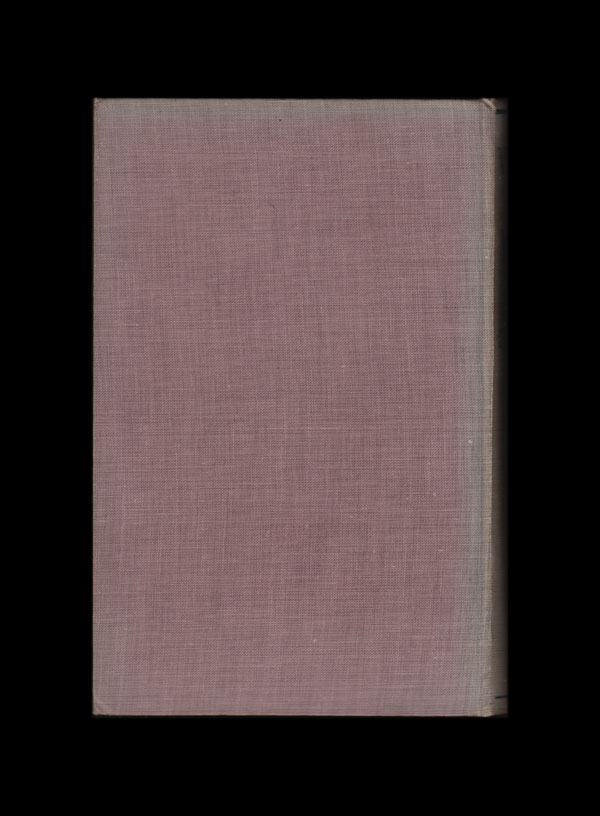


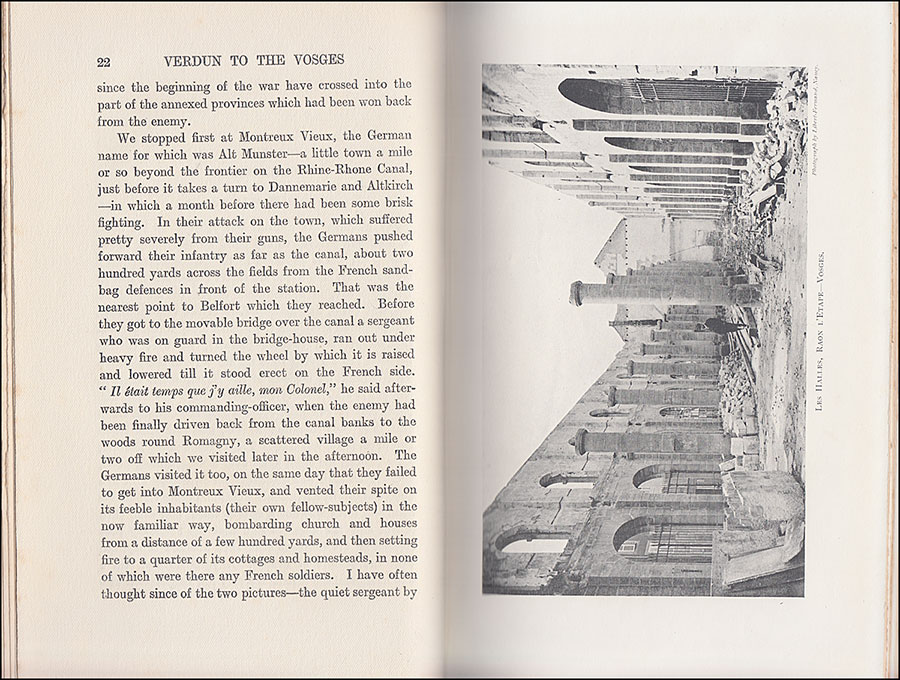
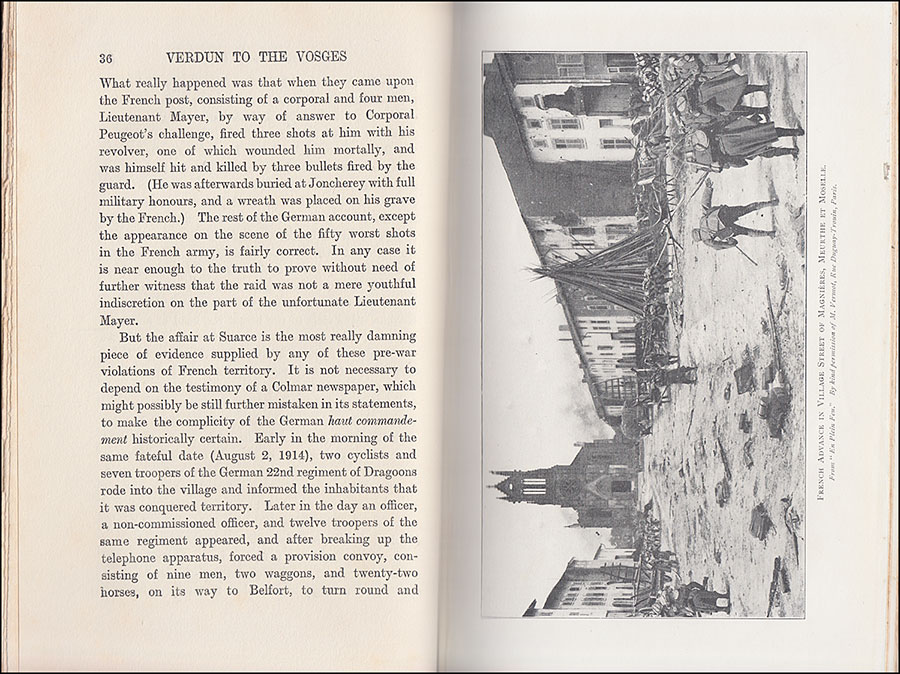
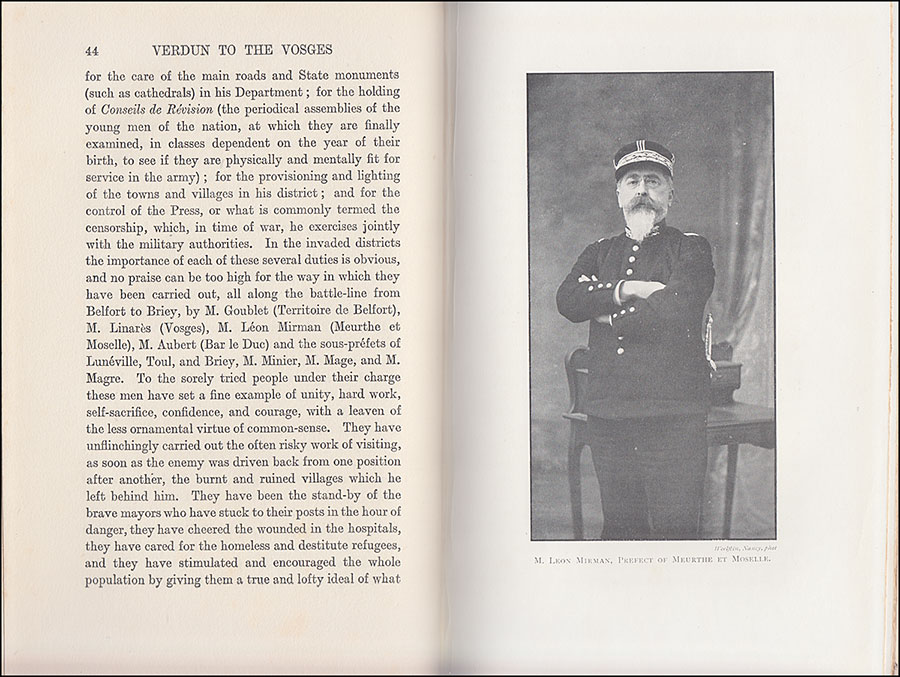
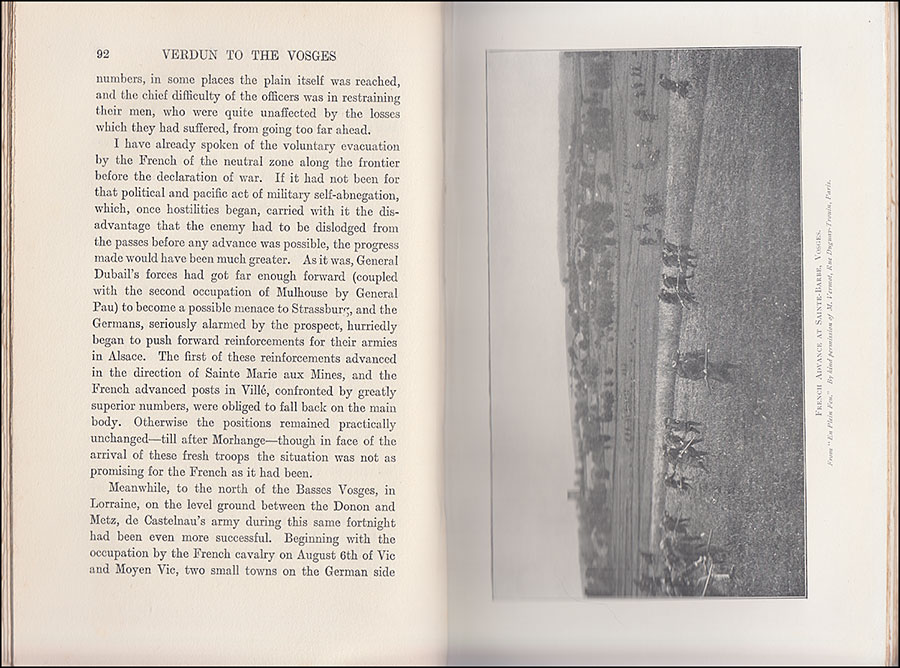
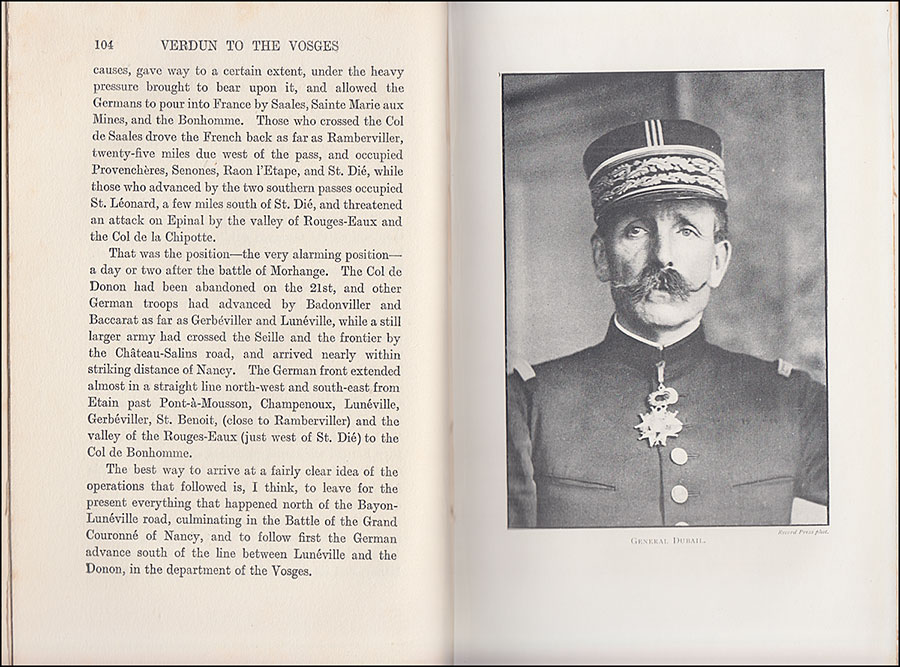
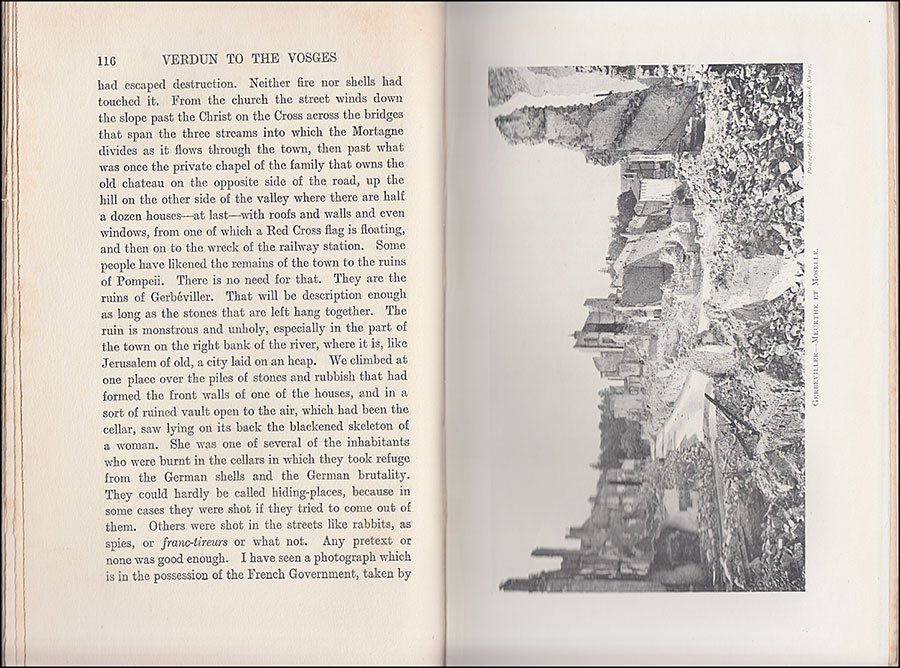
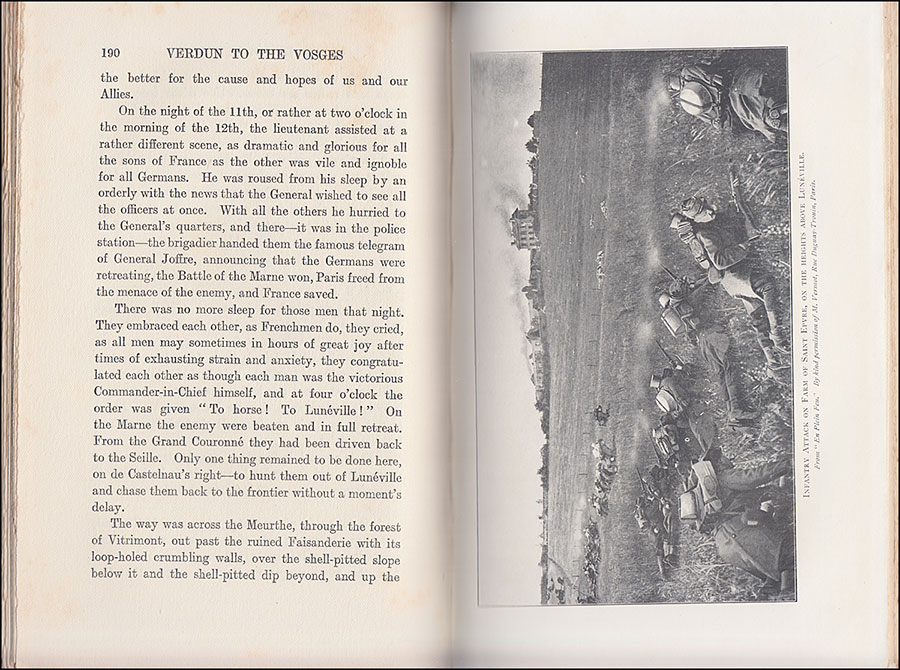
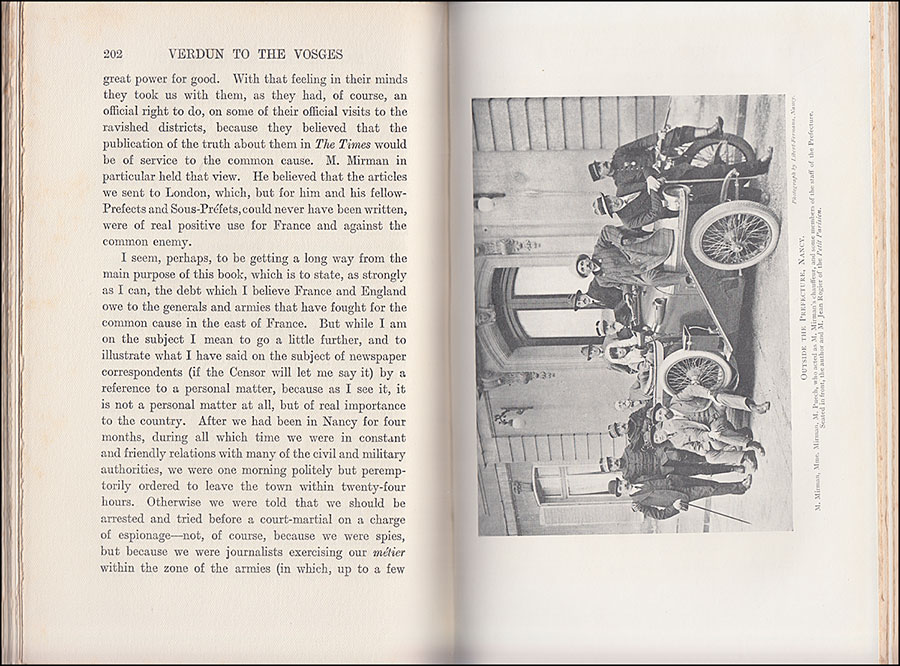
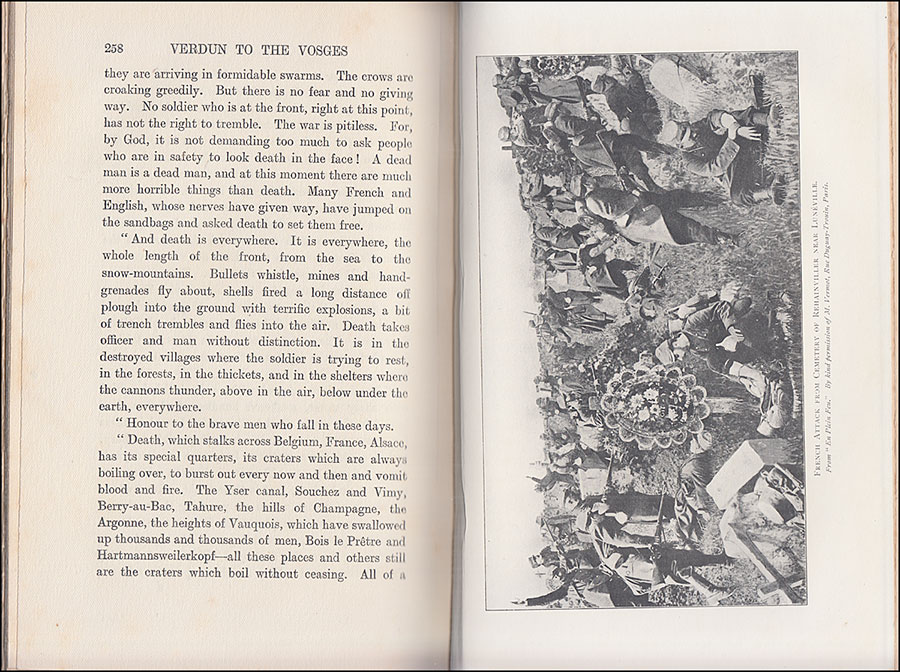 |
|
 |
|
 

|
 |
|
U.K. buyers:
|
To estimate the
“packed
weight” each book is first weighed and then
an additional amount of 150 grams is added to allow for the packaging
material (all
books are securely wrapped and posted in a cardboard book-mailer).
The weight of the book and packaging is then rounded up to the
nearest hundred grams to arrive at the postage figure. I make no charge for packaging materials and
do not seek to profit
from postage and packaging. Postage can be combined for multiple purchases. |
Packed weight of this item : approximately 900 grams
|
Postage and payment options to U.K. addresses: |
-
Details of the various postage options can be obtained by selecting
the “Postage and payments” option at the head of this
listing (above).
-
Payment can be made by: debit card, credit
card (Visa or MasterCard, but not Amex), cheque (payable to
"G Miller", please), or PayPal.
-
Please contact me with name,
address and payment details within seven days of the end of the
listing;
otherwise I reserve the right to cancel the sale and re-list the item.
-
Finally, this should be an
enjoyable experience for both the buyer and seller and I hope
you will find me very easy to deal with. If you have a question
or query about any aspect (postage, payment, delivery options
and so on), please do not hesitate to contact me.
|
|
 |
 |
|
International
buyers:
|
To estimate the
“packed
weight” each book is first weighed and then
an additional amount of 150 grams is added to allow for the packaging
material (all
books are securely wrapped and posted in a cardboard book-mailer).
The weight of the book and packaging is then rounded up to the
nearest hundred grams to arrive at the shipping figure.
I make no charge for packaging materials and do not
seek to profit
from shipping and handling.
Shipping can
usually be combined for multiple purchases
(to a
maximum
of 5 kilograms in any one parcel with the exception of Canada, where
the limit is 2 kilograms). |
Packed weight of this item : approximately 900 grams
| International Shipping options: |
Details of the postage options
to various countries (via Air Mail) can be obtained by selecting
the “Postage and payments” option at the head of this listing
(above) and then selecting your country of residence from the drop-down
list. For destinations not shown or other requirements, please contact me before buying.
Due to the
extreme length of time now taken for deliveries, surface mail is no longer
a viable option and I am unable to offer it even in the case of heavy items.
I am afraid that I cannot make any exceptions to this rule.
|
Payment options for international buyers: |
-
Payment can be made by: credit card (Visa
or MasterCard, but not Amex) or PayPal. I can also accept a cheque in GBP [British
Pounds Sterling] but only if drawn on a major British bank.
-
Regretfully, due to extremely
high conversion charges, I CANNOT accept foreign currency : all payments
must be made in GBP [British Pounds Sterling]. This can be accomplished easily
using a credit card, which I am able to accept as I have a separate,
well-established business, or PayPal.
-
Please contact me with your name and address and payment details within
seven days of the end of the listing; otherwise I reserve the right to
cancel the sale and re-list the item.
-
Finally, this should be an enjoyable experience for
both the buyer and seller and I hope you will find me very easy to deal
with. If you have a question or query about any aspect (shipping,
payment, delivery options and so on), please do not hesitate to contact
me.
Prospective international
buyers should ensure that they are able to provide credit card details or
pay by PayPal within 7 days from the end of the listing (or inform me that
they will be sending a cheque in GBP drawn on a major British bank). Thank you.
|
|
 |
 |
|

(please note that the
book shown is for illustrative purposes only and forms no part of this
listing)
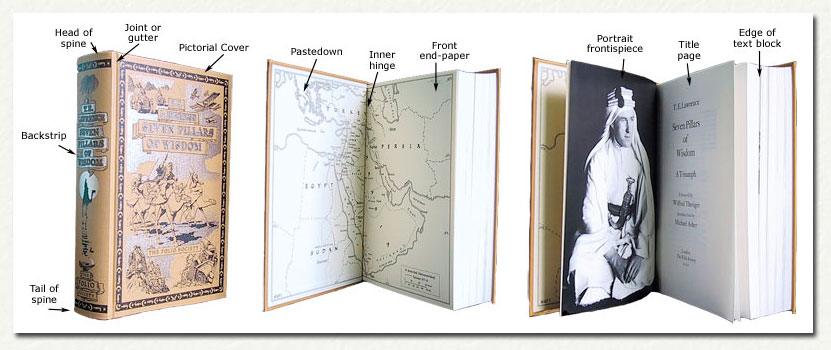
Book dimensions are given in
inches, to the nearest quarter-inch, in the format width x height.
Please
note that, to differentiate them from soft-covers and paperbacks, modern
hardbacks are still invariably described as being ‘cloth’ when they are, in
fact, predominantly bound in paper-covered boards pressed to resemble cloth. |
|
 |
 |
|

Fine Books for Fine Minds |
I value your custom (and my
feedback rating) but I am also a bibliophile : I want books to arrive in the
same condition in which they were dispatched. For this reason, all books are
securely wrapped in tissue and a protective covering and are
then posted in a cardboard container. If any book is
significantly not as
described, I will offer a full refund. Unless the
size of the book precludes this, hardback books with a dust-jacket are
usually provided with a clear film protective cover, while
hardback books without a dust-jacket are usually provided with a rigid clear cover.
The Royal Mail, in my experience, offers an excellent service, but things
can occasionally go wrong.
However, I believe it is my responsibility to guarantee delivery.
If any book is lost or damaged in transit, I will offer a full refund.
Thank you for looking.
|
|
 |
 |
|
Please also
view my other listings for
a range of interesting books
and feel free to contact me if you require any additional information


Design and content © Geoffrey Miller |
|
 |
|
|
|